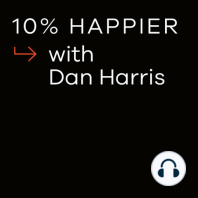55 min listen

How to Handle Anger, Uncertainty, and Self-Loathing | Mushim Patricia Ikeda
How to Handle Anger, Uncertainty, and Self-Loathing | Mushim Patricia Ikeda
ratings:
Length:
71 minutes
Released:
May 5, 2021
Format:
Podcast episode
Description
When somebody wrongs you, what is the wise way to handle your anger? Is forgiveness possible? What about friendliness? My guest today has a lot of thoughts about how to handle anger and how to respond to people who mean you harm.
It might surprise you to hear from a Buddhist teacher who actually isn’t utterly disparaging of anger. In fact, she is proud (somewhat facetiously) of having been called “the original Angry Asian Buddhist.” Her name is Mushim Patricia Ikeda, and she is my kind of Buddhist. She self-describes as “snarky,” and, as you will hear, she loves to laugh. She has doable, down-to-earth strategies, and she makes a compelling, if counterintuitive, case for the pragmatism of sending goodwill to people who want to harm you.
Mushim is a core teacher at the East Bay Meditation Center. She is a writer, activist, and diversity consultant. She has trained for decades as both a lay and monastic Buddhist. Aside from anger, we also discuss how to handle uncertainty, and what Mushim calls a “pandemic of self-loathing” in our culture. But we begin with some candid talk about the trauma of being an Asian-American during a time of rising violence against the AAPI community.
This is the second in a two-part series on the uptick in anti-Asian violence -- a trend that should be particularly worrisome for this audience, given the Asian roots of meditation and many of the other happiness-producing modalities we talk about on this show. If you missed it, go check out Monday’s episode, where we explore the history of anti-Buddhist and anti-Asian violence in America (which started decades before the pandemic), and the hurt felt by many Asian-American Buddhists about how they can be overlooked by other American Buddhists, including, sometimes, me.
Two other items of business: first, are you interested in teaching mindfulness to teens? Looking to carve your own path and share this practice in a way that feels real, authentic, and relevant in today’s world? Our friends at iBme are accepting applications for their Mindfulness Teacher Training program - catered towards working with teens and young adults. The last round of applications are due May 15th and scholarships are available. For more information and to apply, check out: https://ibme.com/mindfulness-teacher-training/.
And second, we want to recognize and deeply thank mental health professionals for all you do. For a year's FREE access to the app and hundreds of meditations and resources, visit: https://www.tenpercent.com/mentalhealth.
Full Shownotes: https://www.tenpercent.com/podcast-episode/mushim-patricia-ikeda-344
It might surprise you to hear from a Buddhist teacher who actually isn’t utterly disparaging of anger. In fact, she is proud (somewhat facetiously) of having been called “the original Angry Asian Buddhist.” Her name is Mushim Patricia Ikeda, and she is my kind of Buddhist. She self-describes as “snarky,” and, as you will hear, she loves to laugh. She has doable, down-to-earth strategies, and she makes a compelling, if counterintuitive, case for the pragmatism of sending goodwill to people who want to harm you.
Mushim is a core teacher at the East Bay Meditation Center. She is a writer, activist, and diversity consultant. She has trained for decades as both a lay and monastic Buddhist. Aside from anger, we also discuss how to handle uncertainty, and what Mushim calls a “pandemic of self-loathing” in our culture. But we begin with some candid talk about the trauma of being an Asian-American during a time of rising violence against the AAPI community.
This is the second in a two-part series on the uptick in anti-Asian violence -- a trend that should be particularly worrisome for this audience, given the Asian roots of meditation and many of the other happiness-producing modalities we talk about on this show. If you missed it, go check out Monday’s episode, where we explore the history of anti-Buddhist and anti-Asian violence in America (which started decades before the pandemic), and the hurt felt by many Asian-American Buddhists about how they can be overlooked by other American Buddhists, including, sometimes, me.
Two other items of business: first, are you interested in teaching mindfulness to teens? Looking to carve your own path and share this practice in a way that feels real, authentic, and relevant in today’s world? Our friends at iBme are accepting applications for their Mindfulness Teacher Training program - catered towards working with teens and young adults. The last round of applications are due May 15th and scholarships are available. For more information and to apply, check out: https://ibme.com/mindfulness-teacher-training/.
And second, we want to recognize and deeply thank mental health professionals for all you do. For a year's FREE access to the app and hundreds of meditations and resources, visit: https://www.tenpercent.com/mentalhealth.
Full Shownotes: https://www.tenpercent.com/podcast-episode/mushim-patricia-ikeda-344
Released:
May 5, 2021
Format:
Podcast episode
Titles in the series (100)
#6: David Gelles: The author of "Mindful Work," New York Times reporter David Gelles is a self-described "sporadic meditator." During the day, Gelles says he uses so-called "meditation hacks," such as waiting a beat or two before picking up a ringing phone or practicing walking meditation around the office at work. Earlier this month, he wrote an op-ed for the New York Times Sunday Review called "The Hidden Price of Mindfulness, Inc.," in which he talked about the "mindfulness economy" and the hundreds of products out there, from books to apps to a dairy-free mayonnaise substitute called Mindful Mayo, all carrying a "mindfulness" label. by Ten Percent Happier with Dan Harris